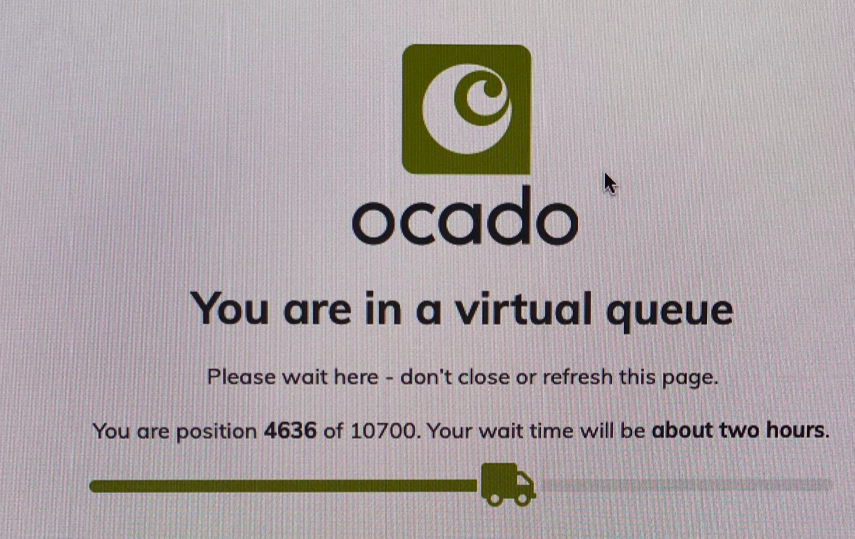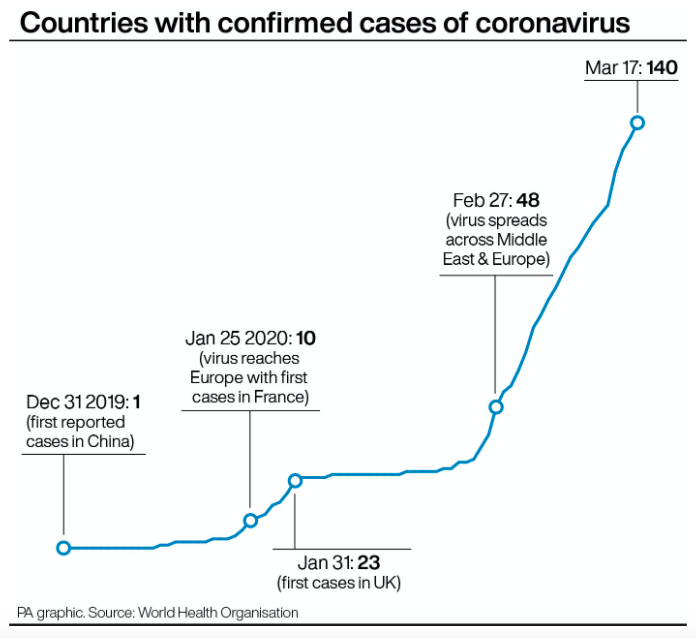The picture that sums up Britons' struggle to buy online groceries during the coronavirus crisis

With Britons being urged to stay at home to stop the spread of coronavirus, many people are ordering groceries online.
However, as demand for food delivery has surge, the waiting time to order has increased with it.
Twitter user Dominic Wakeford summed up the experience by posting a picture of his waiting time with online grocery retailer Ocado – which stood at “about two hours”.
The screenshot of his virtual queue also showed that he was in position 4,636 of 10,700 people all waiting to order.
Missing the thrill of getting tickets for cultural events? Go on the Ocado website to recreate the experience. pic.twitter.com/JXgIV7j6O8
— Dominic Wakeford (@domwakeford) March 18, 2020
Others also shared their experiences of trying to order from online grocery shopping websites as they were overloaded by demand.
Currently 2043 in the queue to just get onto the Ocado website.
— Sarah Mattocks 🕷🕸 (@sarah_mattocks) March 17, 2020
@Ocado I have been charged my usual 2.99 smart pass payment today although I am unable to access your app and now the website is showing me this!! Its almost impossible for me to use your service! How do I go about cancelling my Smart Pass and getting a refund this is ridiculous pic.twitter.com/VDLTuFs2Pl
— Marzipanpanda (@marzipanpanda) March 18, 2020
We occasionally use Ocado for work, so thought I would check how its getting on.....luckily we don't need to order 😱 pic.twitter.com/dM2XSRyaeD
— Chris Bignell (@chrisbignell) March 18, 2020
@Ocado I opened this page at about 9pm last night. Your time estimates are way way off. pic.twitter.com/1tjYNlUMUE
— Nick Marchini (@Nick_Marchini) March 18, 2020
As a result of the massive demand, Ocado has announced it is no longer taking new customers.
The company said in a statement it was “working hard to increase our delivery capacity”.
Ocado have stopped taking new customers. Their website is currently down. Extraordinary times for online food retail.
The one area of retail that is experiencing a bounce in coronavirus times & many are unable to cope with surge in demand. pic.twitter.com/YXWjDTNQLs— Ashley Armstrong (@AArmstrong_says) March 13, 2020
Supermarkets have seen a huge surge in demand for delivery services – no slots are available until next month for both Tesco and Waitrose in some parts of the South East.
Meanwhile, Sainsbury’s chief executive Mike Coupe has said all stores will be open only to the elderly and vulnerable for the first hour of trading on Thursday, but they will also open for an hour longer so other shoppers do not miss out.
Latest coronavirus news, updates and advice
Live: Follow all the latest updates from the UK and around the world
Fact-checker: The number of Covid-19 cases in your local area
Explained: Symptoms, latest advice and how it compares to the flu
Coupe added that as of Thursday, Sainsbury's will be closing its cafes and its meat, fish and pizza counters to free up freight capacity for essential products.
Customers will also only be able to buy a maximum of three of any grocery product and a maximum of two on the most popular items such as toilet roll, soap and UHT milk from Wednesday onward.

Iceland outlets across the country have also introduced reserved time slots to give the vulnerable and the elderly a chance to shop in store.
Tesco has also brought in similar purchasing restrictions to curb panic-buying, particularly on antibacterial wipes, dried pasta and toilet roll.
It was forced to take its mobile app offline temporarily due to high demand on Tuesday, and announced it would be reducing the hours of all of its 24-hour stores to 6am to 10pm.


Elsewhere, Morrisons announced on Tuesday it is creating 3,500 jobs to meet surging demand for its home delivery service.
The chain said it would be recruiting 2,500 pickers and drivers and hiring about 1,000 people to work in distribution centres.
It is also planning a new call centre for those without access to online shopping, and is launching of a new range of simple-to-order food parcels on next Monday.
The surge in delivery demand came as transport secretary Grant Shapps authorised a temporary relaxation, until 16 April, of the drivers' hours rules to help deliver goods to stores across the country.
A Department for Transport statement said the relaxation applies only to drivers supplying food and "essential products to supermarkets”.
it added: "This includes the movement of such goods from importers, manufactures and suppliers to distribution centres. It does not apply to drivers undertaking deliveries directly to consumers.”

 Yahoo News
Yahoo News 


